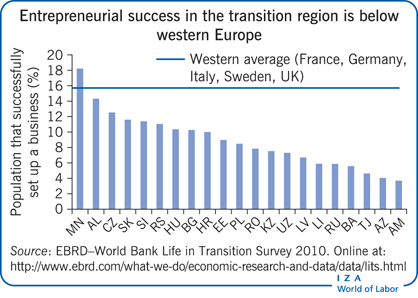Elevator pitch
Entrepreneurship is an important lever for spurring transition in the economies of the former Soviet Union and Central and Eastern Europe. Utilizing diversity, in terms of religion or gender, can positively affect entrepreneurial development. Programs that encourage entrepreneurial initiatives (such as business start-ups) in culturally diverse localities should rank high on the policy agenda. Prompting women to start a business, along with female-friendly measures (including targeted legislation), can positively affect entrepreneurial behaviour and the performance of existing enterprises.

Key findings
Pros
Cultural differences can encourage more innovative, creative, and productive business start-ups due to complementarities in skills and approaches.
Productivity gains resulting from cultural diversity may be higher in more economically advanced societies, as they have more financial and institutional resources to take advantage of diversity.
Enterprises with more women in top management positions are more successful in transition economies.
Companies with more female managers are better positioned for serving untapped markets dominated by women and children and for improving corporate governance.
Cons
Cultural diversity can breed conflict, less growth, and less trust in others, due to differences in social values and norms.
Culturally diverse societies may find it difficult to agree on the provision of public goods, such as education or healthcare.
Localities with low-quality public goods are more likely to have (or attract) residents engaging in entrepreneurship resulting from “necessity,” rather than from “opportunity” (which drives growth).
Entrepreneurship among women or religious minorities could be a sign of discrimination rather than a marker of entrepreneurial spirit.
More diverse groups (in terms of culture or gender) may find it harder to enforce contracts.